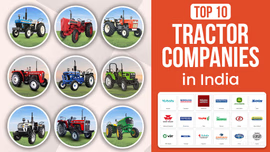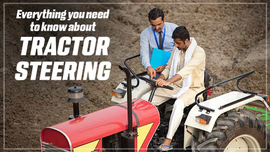Why do Tractors have larger Rear Tyres? - A Practical Breakdown

Table Of Content
- Introduction
- What are the advantages of a smaller front wheel in a tractor?
- Why are the rear wheels of a tractor very wide?
- What are the advantages of a smaller front and larger rear tyre configuration?
- Conclusion
Introduction
Tractor tyres are available in different sizes. It is a topic of discussion why tractor’s front tyres are smaller than the rear tyres. This design is not random; it is provided after careful consideration of the tractor's overall performance in various applications and conditions.
Tractors are specially developed for irregular and tough terrains, such as farmlands, muddy tracks, and inclined surfaces. Many reasons are there for the difference in the sizes of front and rear wheels. The major reasons are traction and steering. The tractor's ability to grip the ground and move forward is called traction, and the ability to manoeuvre is the work of steering.
What are the advantages of a smaller front tyre in a tractor?
Front tractor tyres play an important role in steering the tractor on different terrains. It allows excellent manoeuvrability, ensuring easy movement in tight spaces and taking sharp turns easily. Some advantages of smaller front wheels are:
- The tractor’s smaller front tyres ensure low turning radius which makes it easy to turn in small fields and ideal for working in orchards and vineyards.
- It also reduce the steering efforts for the operator to a great extent, as the operator would have to apply less effort to steer the tractor easily. This is because small tyres mean smaller soil contact and thus lower effort
Why are the rear wheels of a tractor very wide?
As the smaller front wheels are important for steering, the wide rear wheels are important for traction. Following are the reasons that justify why the tractor's rear tyres are wide:
- Larger rear tractor tyres provide more surface area in contact with the ground, distributing the weight of the tractor and any attached implements more effectively.
- This increased contact area improves traction, preventing the tractor from getting stuck in soil, mud, or other challenging conditions.
- When the tractor's rear tyres encounter resistance, the added weight and surface area enable them to generate more friction and maintain forward movement.
- It is particularly advantageous for tasks like ploughing, tilling, and hauling heavy loads, ensuring better productivity.
What are the advantages of a smaller front and larger rear tyre configuration?
Tractors come with smaller front and bigger rear wheels for specific functional and operational reasons as per the requirement of various farm activities. This configuration is often called ‘differential tyre size.’ It is a careful decision taken by manufacturers to optimize the tractor's efficiency and performance. Let's discuss the advantages of a small front and larger rear tyre configuration.
Weight Distribution
The implements are attached in the back side in tractors, which makes the rear part heavy. Thus, larger rear tyres will help distribute the weight more evenly, ensuring the front end doesn't get heavy.
Power & Traction Transfer
Big rear tyres in tractors offer more surface area and better traction, especially during applications like tilling, ploughing, and pulling heavy loads. Thus, it ensures ideal power transfer from the engine to the surface.
Minimized Soil Compaction
Small front tyres apply less pressure on the soil, reducing soil compaction. It is important in farming, as compacted soil can hamper the growth of roots and limit the overall yield. The large rear tyres help distribute the tractor's weight more effectively, further reducing the chances of soil compaction.
Steering Maneuverability
Small front tyres increase the tractor's steering responsiveness and manoeuvrability. It is crucial when the tractor moves through fields, around obstacles, or at the time of planting and harvesting when precise control is required.
Versatility in Farm Operations
Tractors are used for a wide range of agricultural operations. The differential tyre size helps them perform effectively in different field conditions, from ploughing to pulling heavy loads, by optimizing traction and distribution of weight.
Improved Stability
The larger rear tyre placement contributes to a lower centre of gravity, enhancing the tractor's stability while pulling heavy implements. Stability is important for avoiding tip-overs and ensuring safe operations on irregular terrains.
Fuel Efficiency
The small front and large rear tyre configurations contribute to an ideal power-to-weight ratio. This efficiency is important for minimizing fuel consumption and enhancing the tractor's performance during farming operations.
Cost-effective Design
The small front and large rear tyre design is cost-effective for producers, allowing simpler steering mechanisms, reducing overall manufacturing costs, and making tractors economically viable for farmers.
Conclusion
The small front and big rear tyre design is a strategic decision taken because of many factors, including weight distribution, manoeuvrability, traction, and soil health. If you are looking for a front or rear tyre for your tractor, then explore Tractorkarvan. We have provided a wide range of tractor tyres from popular brands, including Apollo, MRF, BKT, etc., on our platform. It will help you choose the right tyre for your tractor with ease.


Related Blogs












